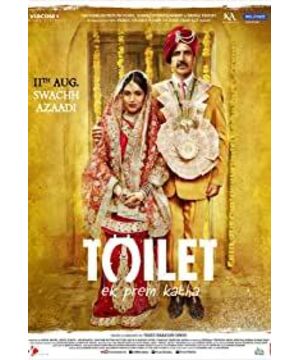Do you know what happened to the kids? The poor children went out at night and they were raped and hung from trees.
Not difficult.
All you have to do is face the opposition of other women and ignore the public accusation that you are blasphemous .
Of course, there must be a husband who is willing to "resist the world for you" .
This is what happens in [ Toilet Hero ] .
01
It's hard for men
India's toilet problem has long been " attracted to the world ".
Most of them poop on the railway and also on the beach. Pooping in the mountains, pooping on the riverbank, pooping on the street. They never hide.
People who defecate in the open air constitute a unique landscape in India.
Even the Indian Minister of Water Resources has joined the army.
In 2012, an institution counted the number of people excreted in the open air within a square kilometer.
Of course India comes out on top.
The built toilets were also abandoned because no one was using them.
In [ Toilet Hero ] , public toilets become barbershops, tailors, and cowsheds.
Why do Indians prefer to defecate in the open air? Here's what their water minister said—
When you want convenience, you have to be convenient.
It sounds quite natural .
There are many benefits of open defecation: early rise, hard work, physical strength, and a breath of wholesome fresh air.
But in fact, it's not.
Excretion in the open leads to the spread of diseases such as cholera, dysentery , and hepatitis A. The country lost more than $54 billion as a result.
This issue also starts with traditional culture .
This is what the movie says-
What exactly is this culture?
Indians generally regard excrement as filth, and a toilet at home is a symbol of "uncleanness" .
Excretion in the outdoor field is to return to nature , which is "clean".
In [Toilet Hero], the male protagonist's father is a devout Hindu, he said:
How can such filth as urine and feces be in the same courtyard as the God of prayer?
There is also a mention of the Indian caste system .
In addition to the four major castes, there is an excluded class of " untouchables ".
My father believed himself to be the highest Brahmin . If there is a toilet in the house that needs to be cleaned by himself, isn't it a "untouchable" way of living?
Many urban and rural areas in India have continued the traditional practice prohibited by official orders, forcing "untouchable" untouchables (mostly women) to clean domestic dry toilets and open excrement.
In the film, the tradition of urinating in the open air has even risen to the height of safeguarding the dignity of the country.
02
women are harder
If men are unwilling to go to the toilet, women's "unwillingness" includes more patience .
The scary thing is that under the cover of long-term unequal status, this kind of patience has become a matter of course, and it has become a willingness.
Even, alienation becomes a virtue .
[ Toilet Hero ] At the beginning, a group of women talked and laughed.
Before dawn broke, it seemed that meeting to go to the remote field for convenience seemed to be a tea party to talk about the family .
It's just that the flashes deliberately thrown on the road and the man's wretched smile broke this happy appearance.
In fact, open-air sizing can cost women more than men.
In most cities and towns in India, a few tiles are pasted against the wall and a few pits are dug to become public toilets exclusively for men.
Women cannot enjoy such "convenience".
Without their own restrooms, women suffer the most because prying eyes are everywhere .
They were forced to drink less water and go out in remote places when it was dark .
This, in turn, brings greater personal safety hazards.
In 2011, more than 400 women were raped on their way to the toilet in India, the BBC reported .
Do you know what happened to the kids? The poor children went out at night and they were raped and hung from trees .
A 17-year-old girl was killed, why? Because his dad didn't build a toilet.
03
Not afraid of difficulties
As early as when India broke away from British rule, Gandhi raised the idea of improving sanitation .
Hygiene is more important than independence.
He did it by himself, cleaning up the feces with his own hands.
In 1999, the Indian government launched the "National Hygiene Campaign" . Funded the construction of more than 90 million toilets.
More than 20 million are still missing, and more than 10 million are no longer in use.
Six years later, the authorities launched the "No Toilets, No Brides" campaign.
Five years later, a certain bride decided to divorce and run away from home because her husband's house did not have a toilet , causing an uproar.
Since then, the movement has gained a nationwide response.
Some Indian women have organized the "Right to Pee" movement accordingly.
In 2014, Indian Prime Minister Moody's announced that he would launch a nationwide "Clean India" campaign to celebrate the 150th anniversary of Gandhi's birth in five years .
Within five years, there will be toilets in every household, and the sanitation problem in India will be solved.
Two years later, a survey revealed:
In the 300 Indian villages that have achieved "every home toilet", about 40% of the residents still defecate outdoors .
In [ Toilet Hero ] , the villagers insisted against building toilets at home.
India's toilet problem is far from solved. As shown in [Toilet Hero], more women stand up for their rights like the heroine .
Last year, there was another divorce in India . The woman was married for five years and couldn't bear her husband's refusal to install a toilet in her home.
Fortunately, the Indian court, which has always handled divorce cases cautiously, finally agreed to this request and said:
In the village, women have to wait until after dark before they can answer the "call of nature", which is not only physical abuse, but an insult to humble women.
Well, at least not alone.
-
Author/Vanschmer
The article was first published on the WeChat public account "Bao Ci Er"
View more about Toilet: A Love Story reviews











